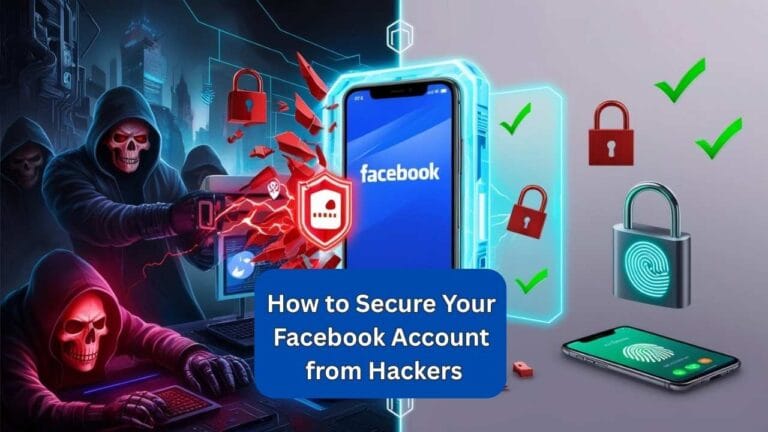Worried your Facebook account might get hacked? You’re not alone, over 160,000 accounts are compromised daily (Meta Security Report, 2024). The good news? With the right precautions, you can lock down your profile like a digital Fort Knox.
In 2025, Facebook remains a central hub for connecting with friends, family, and communities. However, its widespread use also makes it a prime target for cybercriminals. Hackers employ increasingly sophisticated methods to compromise accounts, leading to identity theft, financial loss, and privacy breaches.
I’ve helped hundreds of clients recover hacked accounts, and one pattern always emerges: most breaches happen because of overlooked settings, not advanced hacking. Take Sarah, a small business owner who lost access to her page last month. “I thought I was careful,” she told me, “until a fake ‘Facebook Support’ message tricked me.” Her story isn’t unique, but it’s preventable. Let’s dive into the real ways to secure your account.
“My Facebook Was Hacked!” Here’s What Actually Happens
Most Facebook hacks exploit weak passwords, phishing scams, or unsecured devices, not Hollywood-style cyberattacks.
A 2024 Norton study found:
- 73% of hacked accounts reused passwords from other breached sites
- 41% fell for phishing links (fake login pages, “account violation” scams)
- Only 6% were hacked via “advanced” methods
Real-World Example:
Mark, a teacher, swore his account was “unhackable”, until a malware-infected game app stole his session cookies. “I didn’t even need to type my password,” he realized. “They just cloned my logged-in browser.”
The Hidden Security Weapon 90% of Users Ignore
Two-factor authentication (2FA) blocks 99% of automated attacks (Meta, 2023), yet only 34% of users enable it.
How to Set Up Real 2FA (Not Just SMS):
- Go to Settings → Security → Two-Factor Authentication
- Choose an authenticator app (Google Authenticator or Authy)
- Why? SMS codes can be hijacked via SIM-swapping
- Add backup codes (print/store them offline)
Pro Tip: For ultra-security, add a physical security key (like YubiKey) under “Authentication Methods.”
“Strong Passwords Are Enough” Debunked
A 12-character password takes 300 years to crack, but hackers don’t brute-force. They phish, leak, or reuse.
The Password Trinity (Do All 3):
- Use a password manager (Bitwarden, 1Password) to generate/store unique passwords
- Enable Facebook’s “Password Alerts” (Settings → Security → Alerts)
Mythbuster: “Changing passwords monthly” is outdated advice. Focus on uniqueness over frequency.
Step-by-Step Lockdown: 15-Minute Facebook Security Upgrade
Phase 1: Immediate Actions (5 mins)
Revoke old sessions: Settings → Security → Where You’re Logged In → Log Out All
Disable face recognition: Settings → Privacy → Face Recognition → “No”
Phase 2: Advanced Protections (7 mins)
Turn on login alerts: Settings → Security → Login Alerts
Restrict data sharing: Settings → Apps → Remove sketchy third-party apps
Phase 3: Nuclear Options (3 mins)
Set up “Trusted Contacts” (3 friends who can help recover your account)
Enable end-to-end encryption for Messenger (Secret Conversations)
The Scam That Tricks Even Smart Users
Fake “Copyright Violation” messages (like the one below) are the #1 phishing tactic in 2024:
“Your page will be banned! Click here to appeal.”
How to Spot Fakes:
- Hover over links (real Facebook URLs always start with https://facebook.com/)
- Never enter passwords after clicking an email link – go to Facebook.com manually
What to Do Right Now If You’re Hacked
- Report it immediately: facebook.com/hacked
- Run a malware scan (Malwarebytes or Windows Defender)
- Freeze payment methods if linked to Facebook Pay
Recovery Story:
“After my hack, I used Facebook’s Trusted Contacts feature. My sister’s verification code got me back in within an hour.” (Priya, Etsy seller)
Security Is a Habit, Not a One-Time Fix
In the digital age, securing your Facebook account is not just about protecting your personal information but also about safeguarding your connections and online presence. By implementing the strategies outlined above, such as enabling two-factor authentication, using strong passwords, and staying informed, you can significantly reduce the risk of unauthorized access.
Remember, cybersecurity is an ongoing process. Regularly reviewing your settings, being cautious of suspicious activities, and educating yourself on emerging threats are essential practices. Taking these proactive steps ensures a safer and more secure Facebook experience for you and your network.
Set a quarterly “Facebook Security Check” reminder. Update passwords, review active sessions, and audit third-party apps.
Bonus: Bookmark Facebook’s Security Checkup Tool:
facebook.com/security
“The best firewall is a skeptical mind. If something feels off—pause, verify, then proceed.”





